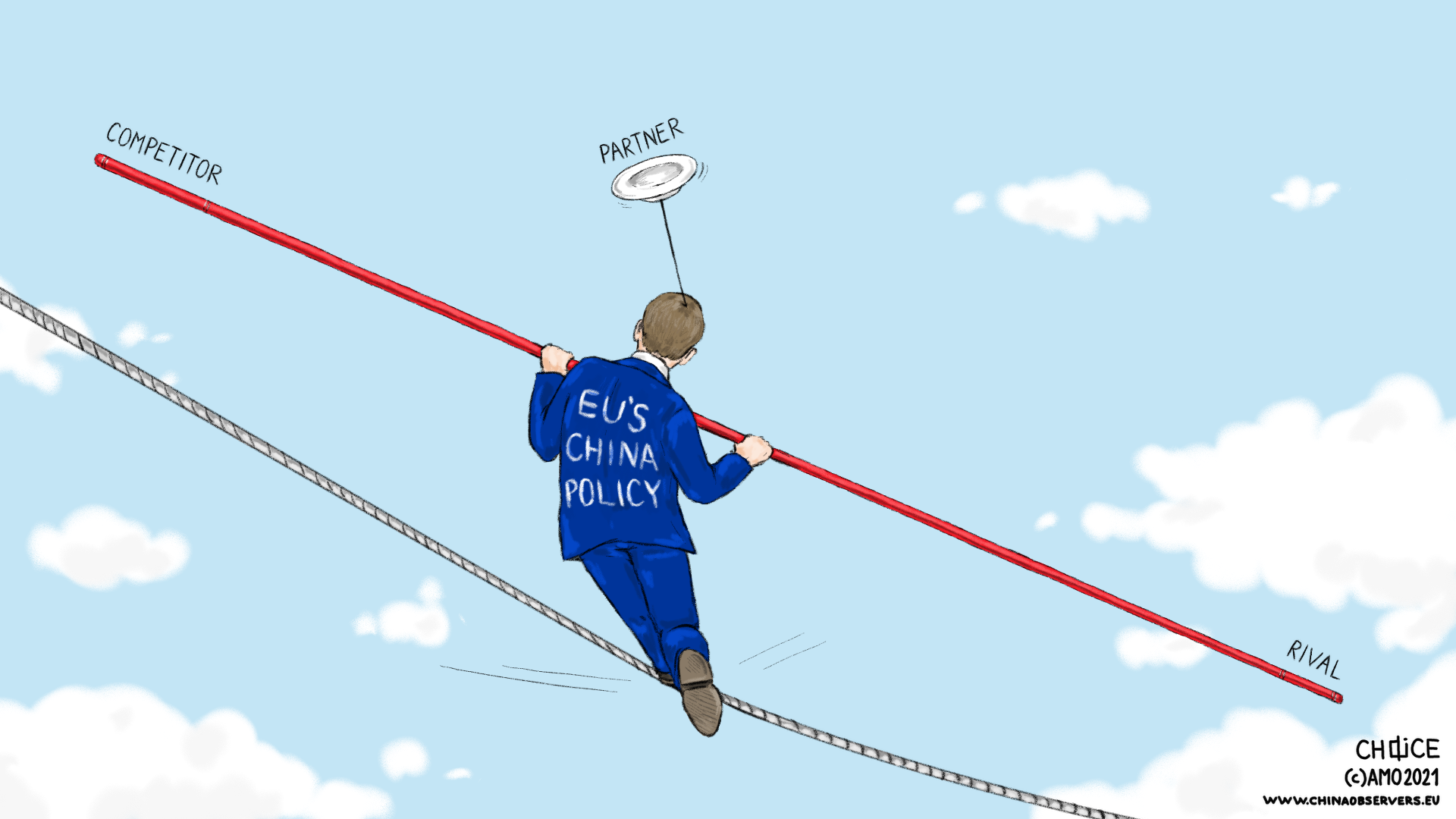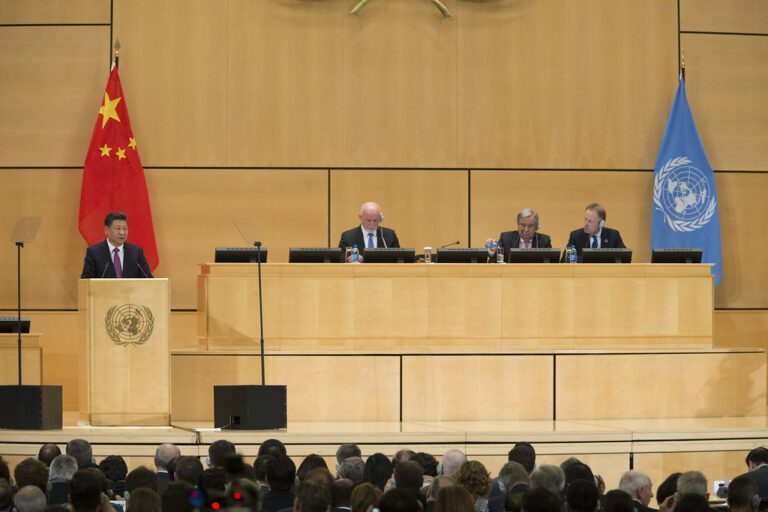The 2025 EU-China Summit: Perspectives from Central and Eastern Europe

As the 25th EU-China summit approaches – scheduled for July 24 in Beijing, following a series of high-level meetings between European and Chinese officials, including the EU-China Strategic Dialogue held on July 2 – we have invited several analysts from the Central and Eastern European (CEE) region to share their views on the upcoming engagements and their significance for both CEE and the EU more broadly. In line with our Future CHOICE initiative, we aim to highlight the voices of both seasoned experts as well as early-career researchers from CEE.

Andreea Brinza
Vice President of the Romanian Institute for the Study of the Asia-Pacific (RISAP), Romania
The 2025 EU-China Summit will take place under the shadow of EU-US relations, particularly in light of the potential repercussions of the 30 percent tariffs that Donald Trump threatened to impose on the EU. As a result, not only Western European countries, but also those in Central and Eastern Europe are more preoccupied with the potential impacts of these tariffs on their economies, than with the outcomes of the EU-China summit.
On top of that, Central and Eastern European countries continue to be focused on Russia’s war in Ukraine, which appears to be escalating instead of reaching an end. Given that previous summits have produced few concrete results, this year’s summit is widely viewed as ceremonial, especially in CEE capitals.
Consequently, no CEE country has taken a significant stance on the summit. Only Poland showed greater involvement, mainly due to its rotating presidency of the Council of the European Union during the first half of the year. Considering the lingering disappointment in the CEE region over China’s unfulfilled promises of investment and infrastructure projects, which generated much publicity but little tangible progress, the CEE countries’ lack of interest in the summit is understandable.
Even if the summit were to produce notable deliverables, some countries would still be dissatisfied with the results. A recurring mistake made by external actors, including China, is treating the CEE region as a monolith. In reality, it is a diverse array of actors with varying national interests and strategic priorities. For instance, while countries like Hungary or Slovakia might welcome economic results, the Baltic states are more focused on geopolitical issues and would prefer greater progress regarding China’s stance on the war in Ukraine and its support for Russia. Thus, most CEE countries are likely to be disappointed with the outcomes of the summit, as it cannot realistically deliver everything for everyone.
The EU-China summit appears to have become little more than a formality – an event that both sides feel obliged to check off their diplomatic calendars. Xi Jinping reportedly declined to travel to Brussels, and the Chinese side has already downsized the summit from two days to one. There were also rumors that Xi may skip the meeting with EU leaders Ursula von der Leyen and António Costa altogether – though the meeting has now been confirmed – underscoring the limited importance China now seems to attach to its relationship with the EU.

Research and Teaching Assistant at the Jagiellonian University & Non-Resident Research Fellow at the Center for Asian Affairs, University of Lodz, Poland
The upcoming EU-China summit takes place at a time of deepening unease and strategic divergence between the European Union and the People’s Republic of China. Two critical issues now dominate the agenda, carrying particularly significant implications for Poland and the wider Central and Eastern European region.
For Warsaw and its regional partners, the most pressing concern in EU-China relations remains Beijing’s ongoing support for Moscow amid the war in Ukraine. This was underscored by Chinese Foreign Minister Wang Yi’s admission to EU Foreign Policy Chief Kaja Kallas that China does not wish to see Russia defeated, fearing a strategic realignment by the United States toward East Asia. This position, which undermines the EU’s efforts to uphold the international rules-based order, is compounded by China’s industrial policies that distort global trade. Massive state subsidies and persistent overcapacity threaten to erode Europe’s industrial base. While Beijing publicly denies the existence of an overcapacity problem, it is increasingly acknowledged within China’s domestic discourse – highlighting a disconnect between its internal assessments and external messaging. For the EU, including the economies of Central and Eastern Europe, these dynamics pose urgent challenges to both security and long-term economic prosperity.
Given these systemic obstacles, there is little reason to expect any tangible outcomes from the upcoming EU-China summit. The gulf between Brussels and Beijing is simply too wide, and the dialogue too performative, to allow for meaningful progress. In fact, the summit’s relocation to Beijing at China’s insistence serves as a stark reminder of the EU’s diminishing leverage and the performative nature of these engagements. Under such conditions, it is worth questioning whether holding the summit at all serves Europe’s interests. A principled refusal – or at the very least, the meeting’s postponement – might have sent a clearer signal of resolve and a demand for genuine reciprocity.

PhD Student at National Chengchi University & Program Assistant at the European Center for Populism Studies, Hungary
The upcoming summit, which coincides with the 50th anniversary of diplomatic relations between the two sides, is awaited with mixed expectations. While it offers an opportunity to reset and revitalize increasingly strained economic ties, many view it as a potentially futile exercise, given the limited prospects for substantive engagement amid ongoing geopolitical and trade tensions.
For Hungary – one of the leading recipients of Chinese foreign direct investment, with major projects from companies such as CATL, BYD, EVE Energy, and Sunwoda – the central issue lies in the discussions about Chinese electric vehicles’ access to the European market. Hungary was among the five EU member states, including Germany, that opposed the imposition of tariffs on Chinese EVs in October last year and has consistently criticized the European Commission’s decision. While Hungary’s traditionally pro-China stance may seem predictable, Budapest could paradoxically benefit from the increased tariffs. In an effort to avoid high import duties, Chinese manufacturers are increasingly motivated to relocate production within the EU. With several large-scale battery plants already under construction and BYD set to build a car manufacturing facility in Szeged, Hungary is well positioned to capitalize on this shift.
The dispute over China’s export controls on rare earth elements (REEs) and other critical raw materials is of particular concern to Hungary, given the central role these materials play in the country’s growing automotive sector. REEs are essential for the production of electric vehicles, particularly for components such as permanent magnet motors. In Hungary, Audi’s plant in Győr – the world’s largest engine factory – relies on materials like neodymium and dysprosium for this purpose. BMW is also preparing to launch electric vehicle production in Debrecen later this year, further underscoring the sector’s expanding demand. In addition to REEs, other critical raw materials are needed for battery manufacturing, making a stable and predictable supply indispensable. From Hungary’s perspective, it is vital that any export restrictions be lifted, rather than replaced with licensing requirements that could disrupt supply chains and affect a key pillar of the national economy.
As the EU and China navigate a complex web of economic and strategic interests, Hungary finds itself uniquely positioned at the intersection of both. Its strong investment ties with China and its growing role in the EV supply chain give Budapest a vested interest in the summit’s outcomes. While Hungary continues to advocate for open trade, it also stands to gain from policies that encourage Chinese production within the EU. Balancing these interests will be key to shaping its stance in the broader EU-China relationship.

Graduate Student of International Relations at Charles University, Czech Republic
The upcoming EU-China summit marks a significant milestone in the EU-China relationship, as it celebrates the 50th anniversary of diplomatic ties between the two. Yet, the trajectory of the relationship has taken a turn that neither side finds favorable – and the European Union may find itself at a disadvantage.
Europe enters the summit amid a fractured geopolitical landscape. The United States under the Trump administration has shifted away from its traditional multilateral approach toward a more unilateral and transactional foreign policy. This shift has raised urgent questions about the reliability of US security guarantees to Europe through NATO. With the ongoing Russia-Ukraine war at the EU’s doorstep and continued Russian saber-rattling along the Baltic and Finnish borders, the EU is under increasing pressure.
With this in mind, recent remarks by Chinese Minister of Foreign Affairs Wang Yi to the EU’s High Representative for Foreign Affairs and Security Policy Kaja Kallas confirmed to the EU that China does not share its interest in a peaceful settlement of the conflict and full restoration of Ukraine’s territorial integrity. Instead, Beijing appears to prefer a more favorable outcome for the Russian Federation. Given that the question of peace in Ukraine is a core interest for both the EU and the Czech Republic, a position of the PRC that contradicts this must be recognized and approached accordingly.
Beyond China’s tacit support for Russia’s war in Ukraine, trade has become another significant issue in the EU-China relations. There is a growing asymmetry in trade dependency, which is a source of concern for Brussels. China has become a vital supplier of many strategically important goods, including pharmaceuticals and green technologies. According to an analysis by MERICS from October 2024, the EU currently faces 421 import dependencies on China, while China has only 120 such dependencies on the EU.
As Europe continues to search for its strategic autonomy, both geopolitical and economic considerations must be front and center in its engagement with China. If the Czech Republic wants to play a greater role in shaping this approach, it should strive to promote deeper political cohesion, which would enable the EU to develop the mechanisms necessary to act as a formidable global actor. Otherwise, Europe risks becoming a fragmented union of states with diverging interests – an easy target for exploitation by China’s vast economic and ever-growing political influence. Just as weakened China once fell victim to unequal treaties imposed by European colonial powers, a similar fate could await fragmented Europe.

Elzė Pinelytė
Associate Expert at the Geopolitics and Security Studies Centre (GSSC), Lithuania
At the recent EU Foreign Affairs Council in Brussels, Lithuania’s Foreign Minister Kęstutis Budrys adopted a firm stance on the principal issues in EU-China relations, highlighting persistent trade imbalances and limited market access stemming from what he described as China’s unfair practices. He also echoed growing calls – from Germany and others – for the EU to fully utilize its toolbox of policy instruments, including the Foreign Subsidies Regulation and the Anti-Coercion Instrument, to protect the EU’s market and competitiveness vis-à-vis China.
Yet, ironically, this tougher line on Beijing coincides with growing unease in Vilnius over the reliability of its long-held transatlantic assumptions. Prominent figures like the EU defense chief Andrius Kubilius have warned that an “American forthcoming withdrawal from Europe is a new reality.” Meanwhile, the Lithuanian Foreign Minister has pointedly reminded Washington that Brussels possesses tools of its own to push back against the US pressure. Together, these signals reflect a cautious openness toward the notion of EU “strategic autonomy” – a concept that Lithuania, historically one of the most pro-American member states, had long viewed with skepticism.
As a result, Lithuania finds itself caught in a strategic conundrum: continuing to champion a hawkish stance on China, while increasingly recognizing that such a position may no longer resonate as strongly as it once did, particularly as alignment with Washington appears increasingly uncertain. In this shifting context, Vilnius seems to be recalibrating its small-state strategy.
In the lead-up to the summit – and irrespective of its outcome – Lithuania has been actively broadening its engagement with the Indo-Pacific region. This includes the signing of a new security cooperation agreement with the Philippines and the expanding economic ties with South Korea, especially in areas such as high-tech innovation and clean energy. Through these efforts, Lithuania appears to be hedging its bets – mitigating both its growing ambivalence toward China and its traditional reliance on transatlantic alignment by cultivating diversified partnerships across East and Southeast Asia.
Written by
CHOICE
CHOICE is a multinational consortium of experts providing informed analysis on the rising influence of the People’s Republic of China within the countries of Central and Eastern Europe (CEE).
Andreea Brinza
AndreebrinAndreea Brînză is a Vice President of The Romanian Institute for the Study of the Asia-Pacific (RISAP). Her research focuses on the geopolitics and geoeconomics of China and especially on the Belt and Road Initiative.
Adrian Brona
AdrianBronaAdrian Brona, PhD, is a research and teaching assistant at the Jagiellonian University and a non-resident research fellow at the Center for Asian Affairs, University of Lodz. His research focuses on China’s domestic politics, foreign policy, and Sino-Polish relations. He has worked on projects examining the Chinese Communist Youth League, political leadership dynamics, and subnational party elites.
Réka Koleszár
RekaKoleszarRéka Koleszár is a PhD student at National Chengchi University in Taipei, Taiwan and a Program Assistant at the European Center for Populism Studies. She holds master’s degrees in Political Science and International Relations with a focus on East Asia, has completed a traineeship at the Council of the EU, and has experience as a Program Assistant at the European Policy Centre.
Alexandr Romancov
AGRomancovAlexandr Romancov is a Master’s student of international relations at the Faculty of Social Sciences, Charles University. His long-term academic interests lie in contemporary China and geopolitics of the Indo-Pacific. He is an incoming student at the National Chengchi University (NCCU) in Taipei. In the past, he published several articles on China and international relations in Czech media outlets like Deník N, Seznam zprávy and Voxpot.
Elzė Pinelytė
ElzePinelyteElzė Pinelytė is Associate Expert at the Geopolitics and Security Studies Center (GSSC), Lithuania, where she studies China's domestic politics and foreign policy, with a focus on Sino-EU relations and its recent developments.


